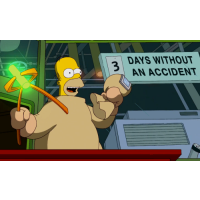Congressional Audit Finds Industrial Radioactive Materials Poorly Secured

Federal regulators have done a poor job of ensuring the safe storage of small but dangerous amounts of radioactive material used in industry, a new government report shows.
The Government Accountability Office (GAO) says the “radiological sources,” used by oil companies, food producers, metal inspectors and others are often not secured properly, leading to the risk of theft. Some of the materials are small enough to fit in a pocket.
In fact, at least four vehicles transporting these radioactive materials have been stolen since 2005, according to the GAO. In some of the cases, the theft was the result of drivers leaving doors unlocked or the keys in the ignition. At some sites radioactive metals are stored in areas protected only by padlocks. The audit also noted that many darkrooms used in medical radiography don’t have burglar alarms.
Senator Thomas Carper (D-Delaware), chairman of the Homeland Security committee, who requested the investigation along with other lawmakers, noted how harmful the materials can be if they fall into the wrong hands.
“If the Boston Marathon terrorists had turned their pressure-cooker bombs into dirty bombs, then the consequences of that tragic day could have multiplied by an order of magnitude,” Carper said in a prepared statement.
Some companies use a loophole in Nuclear Regulatory Commission regulations that makes storage requirements less stringent for smaller amounts of nuclear materials. So the companies with large amounts of the materials simply divide them up and store them in smaller containers.
-Noel Brinkerhoff
To Learn More:
Security of Sites Storing Small Radioactive Material Is Found to Be Lacking (by Matthew Wald, New York Times)
Nuclear Nonproliferation: Additional Actions Needed to Increase the Security of U.S. Industrial Radiological Sources (Government Accountability Office) (pdf)
Nuclear Site Safety Official Fired After Her Repeated Warnings of Safety Problems (by Noel Brinkerhoff, AllGov)
- Top Stories
- Unusual News
- Where is the Money Going?
- Controversies
- U.S. and the World
- Appointments and Resignations
- Latest News
- What If China Invaded the United States?
- Donald Trump Has a Mental Health Problem and It Has a Name
- Trump Goes on Renaming Frenzy
- Trump Deports JD Vance and His Wife
- Trump Offers to Return Alaska to Russia






Comments